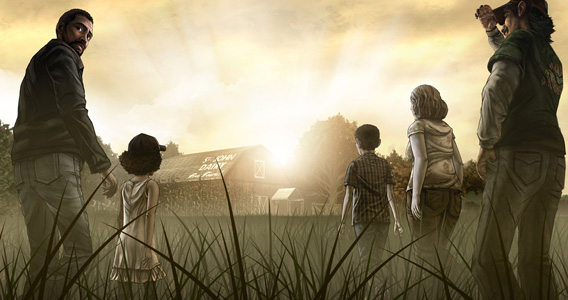
I’m not entirely happy with the choices that I made whilst stumbling through the second chapter of Telltale Game’s The Walking Dead series.
An awkward feeling lingered after I put down the controller, thinking back on being directly confronted about something I’d decided to say about another member of the group, moments where I could have reacted more quickly to help, and making a hasty decision that caused Clementine to witness a violent act by my own hands. But this isn’t the typical groundhog day situation where I feel obliged to go back and live a more ideal day, because there are no ideal choices to be made here, only the constant pull between survival and my own humanity – the core of the source material that Telltale does such an exemplary job of capturing, so that all one can do is take a deep reflective breath after the experience draws to a close.
I’ve spent countless hours living the virtual lives of others and making decisions for them. And while that process has strived to become less black and white in the gaming medium, The Walking Dead hits a nerve of discomfort for me that seems to speak to how it is raising the bar, not just because there are no right or wrong decisions here, but because these are decisions I’d simply rather not have to make – I suppose this is another instance of being confronted with the downside of that being an adult business.
I still catch myself trying to outthink the process, searching for some ideal solution for each point of conflict, but the chaotic nature of the zombie apocalypse works well here to force more heated reactions that I can’t entirely explain my rationale for, which seems a bit more honest in capturing what really sucks about making hard decisions – living with them afterwards.
Elsewhere, Telltale continues to surprise me with a level of more direct interaction that convinces the idea that The Walking Dead is a game and not a visual novel. Action sequences continually arise, using quicktime prompts and some hectic windows of reaction time that certainly played a part in influencing several of those uncomfortable decisions. The greater stress remains the fight to maintain the group rather than fending off the zombie horde, convincing me that Telltale’s shtick was the best choice in trying to capture the franchise for the gaming set.
As with the source material, I only wish the constant tension didn’t remind me how impossible it is to keep everyone happy, and maybe how spending too much time with anyone inevitable discovers some bumps in the relationship.
The most interesting bit about making decisions here remains the way the reactions of others to one decision influences how I approach each new situation. I can’t recall ever making a decision within a videogame based on feeling bad about how the last one might have made me look. I suppose that has me slightly dreading where my decisions might lead me in the next chapter, but I can’t deny that I’m several shades eager to find out.
